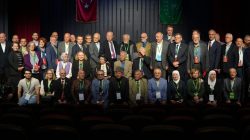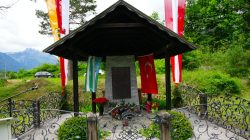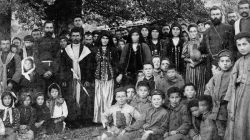
There are currently 21 illegal police patrols set up in the zone of conflict by the Interior Ministry of Georgia without the approval of the Joint Control Commission and they cause serious trouble by insulting, assaulting and even sometimes killing the passangers, according to information received from the South Ossetia section of the Joint Control Commission. Aren’t the Peace Forces of the Commonwealth of Independent States (CIS), that is to say, the peace-keeping troops, responsible for legally doing away with those police patrols?
It is perhaps better to address this question to both the Command Headquarters of the CIS Peace Forces and the Co-Presidents of North as well as South Ossetia of the Joint Control Commission. However, the 1994 treaty will doubtlessly tell us that only the peace forces have charge of the maintaining of security as well as of command in the zone of conflict. But I reiterate that the treaty does not specify the course of action for the peace forces to take when Georgia’s Interior Ministry becomes the major factor that violates security and causes disorder. Security forces of the sides can actively move around the zone of conflict and install police patrols there only with approval from the Joint Control Commission. But no approval was ever sought from the Joint Control Commission for any one of those 20 police patrols. In fact, that does not worry the Georgian side anymore. The CIS Peace Forces will readily respond to a possible request from the Interior Ministry of Georgia to do away with illegal police patrols; however, the Georgian Interior Ministry has not expressed such a request yet, which leaves it on the shoulders of South Ossetia’s Ministries of Interior as well as of Defense to get rid of those police patrols.
To what degree do the Georgian troops of the CIS Peace Forces act in agreement with troops of other nations? How can the plain refusal of the Georgian troops to take orders from the joint commander be ever explained?
It was just in 2004 when Georgia began to use its own peace forces as an instrument of maintaining its regional territorial integrity instead of solving the conflict between itself and Ossetia. What kind of agreement can ever be talked of when the Georgian peace-keeping troops try to conceal Georgia’s military maneuvers as well as coercive decisions to maintain the territorial integrity of Georgia? The Georgian peace-keeping troops were completely removed from the Command Post of the CIS Peace Forces… And it is interesting to know that this is something good because it frees both Russia and South Ossetia from any constraints left on them. The Georgian peace-keeping troops are no longer peaceful. They are an ordinary group of troops tied to the Defense Ministry of Georgia whose reasons for involvement neither in the zone of conflict nor in South Ossetia can be quite known. That is to say, Tbilisi has itself left its own peace-keeping troops outside the scope of laws. It would have been a silly thing not to use this.
It is obvious that the Georgian side consciously wants to bring the peace process into disrepute; and furthermore, it looks to the future for a chance to have the Russian peace forces replaced by the international police forces. Don’t you think that regular monitoring of the peace forces and actions resolutely taken within the limits of authority of the CIS Peace Forces will serve to improve their authority as well as to help them to accomplish their mission in a better way?
Things that are currently taking place between Georgia and South Ossetia are meant to calm down the invader and to keep the status quo safe. Both Russia and Europe and the United States are far more careful nowadays, because they can understand that South Ossetia and Abkhazia altogether will be too much for Tbilisi to swallow and digest. Even if we assume that Tbilisi can do it, this will only lead to the disintegration of Georgia, because Georgia does not hold the socio-economic potential to help South Ossetia and Abkhazia to develop and integrate with Georgia. Georgia can only be saved by America from breaking up. Therefore, neither Russia nor America nor Europe have the kind of plans to solve the question of separation in a way that will either earn Georgia a powerful role to play in the region or help it to return to the grand old days that it enjoyed as a mini empire within the Soviet Union. The fact that Tbilisi will never be able to extend its rule over South Ossetia and Abkhazia only adds to the embarrassment for Georgians–the would-be descendants of the Georgian Empire.
Under these circumstances, Georgia will do its best to use coercion either to solve the conflict between Georgia and Ossetia or to get this or that political decision to be accepted. When Georgia is left with no other chance, the Georgian troops may be ordered to attack Tskhinvali merely as a way of seeking its revenge even if there are only five minutes left for South Ossetia to earn international recognition. At the end of the day, Georgia will have lost the beautiful region of South Ossetia. It is up to the administration of South Ossetia and to the courage as well as determination of Russian peace forces that are seen as the only guarantors of peace in the zone of conflict not to allow things to develop as part of a power game and to respond similarly to the pressure of Georgia.
ÖZ/FT (Agency Caucasus)
Source: Osradio



